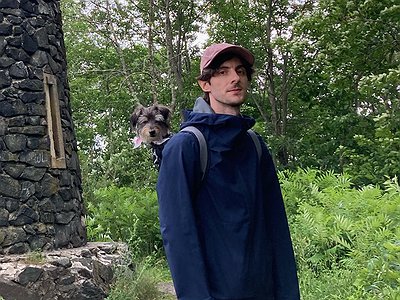Take us through a day in your life, from a possible morning routine through to your work, please. Do you have a fixed schedule? How do music and other aspects of your life feed back into each other - do you separate them or instead try to make them blend seamlessly?
I have a relatively standard daily routine, especially in the past year. My day starts at around 7 a.m. with my first cup of coffee and ends around 11 p.m. with some reading. In between, I perform my day job from home, and my wife and I take turns taking our dog on his four daily walks. I work on music only when I can carve out an hour or two outside my other responsibilities, and as a result I tend to work on music very quickly when I get the chance. Having an easily accessible sample library has made it so that when I get a creative itch, it takes little time to boot up my computer and start pulling samples into a project.
Can you talk about a breakthrough work, event or performance in your career? Why does it feel special to you? When, why and how did you start working on it, what were some of the motivations and ideas behind it?
I’m not sure I can point to a single breakthrough moment, so I will use this as an opportunity to mention my favorite event series of the past decade. Since around 2012, my friend Dan Goldberg has been hosting “Mountain Shows,” hiking trips in the Hudson Valley, where participants periodically stop to watch musicians perform along the trail. I have performed at several of these events over the years, using a portable battery-powered setup. I am always amazed at the community-building aspect of these shows. Through the shared experience of climbing a mountain, participants bond in ways that they never would otherwise.
There are many descriptions of the ideal state of mind for being creative. What is it like for you? What supports this ideal state of mind and what are distractions? Are there strategies to enter into this state more easily?
Nothing motivates me to work on something more than an approaching deadline. As creative projects tend to be open-ended, I try to make a schedule of self-enforced deadlines to set aside time to work on music. Even if the resulting recordings are discarded, it forces me to continue to engage in my creative practice.
Music and sounds can heal, but they can also hurt. Do you personally have experiences with either or both of these? Where do you personally see the biggest need and potential for music as a tool for healing?
I generally do not seek out music that is harmful, other than perhaps the inner ear damage that comes along with listening at loud volumes. I am a little skeptical of music that is advertised as being for purely healing or meditative purposes, but I do believe that music can be an effective form of relief for people. I tend to listen to music that complements my current emotional state, and I hope that the music I make can do the same for other people.
There is a fine line between cultural exchange and appropriation. What are your thoughts on the limits of copying, using cultural signs and symbols and the cultural/social/gender specificity of art?
As an artist that primarily works with samples, I believe there is value in manipulating a found sound or image and presenting it in an innovative or unexpected way. That said, I am careful to avoid reinforcing stereotypes or appropriating cultural imagery. I generally try to record my own sound samples, select them from an open-source library, or manipulate them to the point that they are unrecognizable from their source.
Our sense of hearing shares intriguing connections to other senses. From your experience, what are some of the most inspiring overlaps between different senses - and what do they tell us about the way our senses work?
Humans seem to be very good at pattern recognition and at seeking connections even when there are no causal links. For example, when an audio clip and an unrelated video clip are paired arbitrarily, there are moments when they somehow synchronize – I have always been interested in this phenomenon. I try to exploit a similar effect in my live performances, letting two or more loops play at different tempos and allowing them to phase in and out of each other.
Art can be a purpose in its own right, but it can also directly feed back into everyday life, take on a social and political role and lead to more engagement. Can you describe your approach to art and being an artist?
My creative approach is more personal than it is overtly political. I set out to make the kind of music that I would want to listen to as part of my day-to-day experience. My interest in making music is rooted in a sort of hobbyist desire to simply create things. In the same way, I get fulfilment from preparing a meal or assembling a plastic model. Unlike cooking or model-building (or many other art forms), audio recordings have the benefit that they are easy to reproduce and share widely.
What can music express about life and death which other forms of art may not?
Most forms of media and art require a person’s full attention. One of the things I love about music is that it can be enjoyed while engaged in other activities – driving, walking, reading, working, and so on. I regularly take music with me wherever I go, and I form strong associations between songs and the physical locations where I listen to them. Listening to music is like reading an old diary entry, activating memories of past experiences and emotions.


